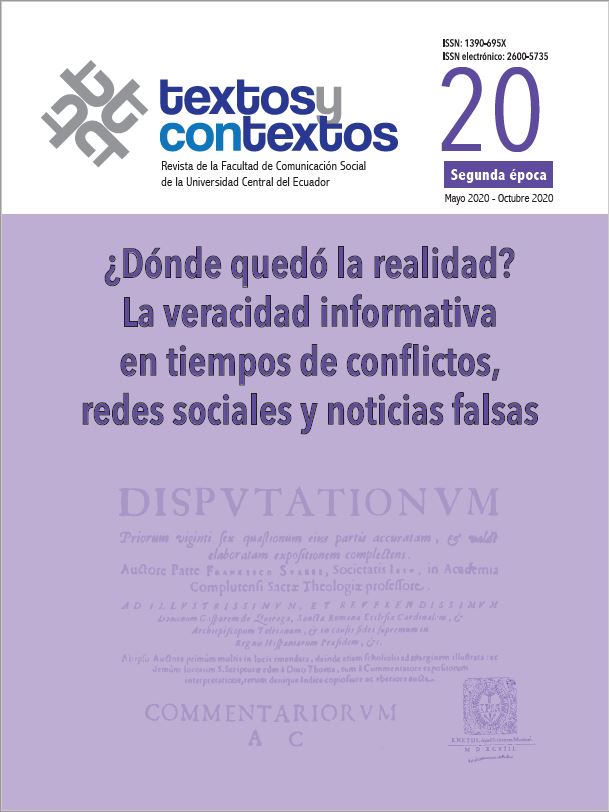Fake news and the construction of agnological stories as a political strategy in the October 2019 mobilizations in Ecuador
Main Article Content
Abstract
Lies deliberately reproduced in social networks have communication and not the expression of thought as their central function; this as part of political strategies of groups that hold power, which seek to destabilize citizens and also seek to underestimate the audience through misleading and malicious content. The semantic, rhetorical and situational analysis of 53 news that circulated on FaceBook, Twitter and WhatsApp the 11 days of the National Unemployment in Ecuador, allowed us to show that the language received by society went through the repressive, expressive and appellative function, the latter, regime from emotionality, which showed the hostile character that was stirred up between social groups.
Downloads
Metrics
Article Details

This work is licensed under a Creative Commons Attribution-NonCommercial 4.0 International License.
References
Amón Rubén, ‘Posverdad’, palabra del año, El País, España. https://elpais.com/internacional/2016/11/16/actualidad/1479316268_308549.html
Blázquez-Ochando, M. (2018). El problema de las noticias falsas: detección y contramedidas.
Conroy, M., Feezell, J. T., & Guerrero, M. (2012). Facebook and political engagement: A study of online political group membership and offline political engagement. Computers in Human behavior, 28(5), 1535-1546.
Eli Pariser: Fake news, los filtros burbuja y la batalla por la verdad, conferencia en el ciclo #TechSociety, celebrada el 19 de junio de 2017 en Espacio Fundación Telefónica. https://www.fundaciontelefonica.com/cultura-digital/conferencias/eli-pariser/
Estela Morales Campos, Coord. (2018) La posverdad y las noticias falsas: el uso ético de la información, México: UNAM, Instituto de Investigaciones Bibliotecológicas y de la Información.
Figueroa, J. A. (2019). El Ecuador: del posmodernismo a la lucha por la hegemonía popular. BORDES, (14), 177-181.
Juan Alberto Clavero (2018) Posverdad y exposición selectiva a fake news. Algunos ejemplos concretos de Argentina, en Contratexto n.o 29, enero-junio 2018, pp. 167-180, Lima: Universidad de Lima.
Mediática, en revista Nueva Sociedad No 269, mayo-junio de 2017, Buenos Aires: Fundación Friedrich Ebert (FES).
Nuria Fernández-García (2017) Fake news: una oportunidad para la alfabetización.
Pillajo, F. S. Resistencia y lucha social indígena en los Andes ecuatorianos: Paro Nacional 2019.
Ramos Alejandro (2018), Información Líquida en la era de la posverdad, en Revista General de Información y Documentación, México:UNAM.
Robert Proctor (2008) Agnotology: The Making and Unmaking of Ignorance. Stanford: Stanford University Press.




